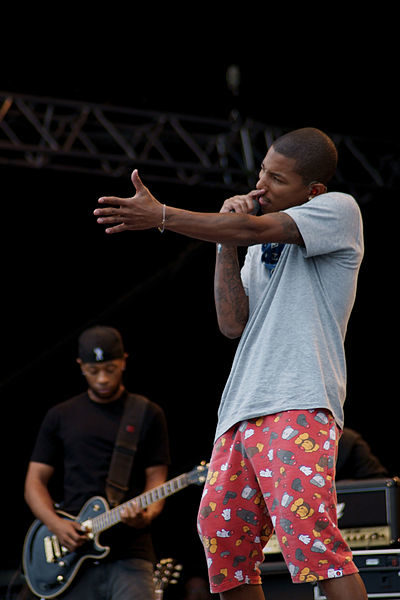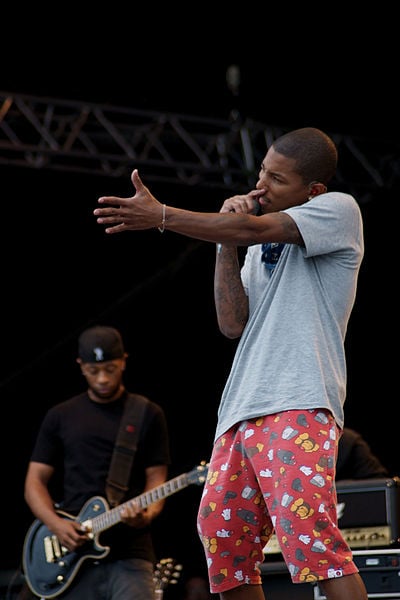
“The truth will set you free. But first, it’ll piss you off.” With these opening words, it is made clear that “NO_ONE EVER REALLY DIES,” N.E.R.D’s latest album, isn’t going to be some run-of-the-mill hip-hop release — this album is going to be political, angry and frantic as hell. In the waning days of 2017, the hip-hop/alt rock band N.E.R.D (consisting of Pharrell Williams and Chad Hugo of legendary 2000s hip-hop production duo The Neptunes, as well as Shay Haley) ended a seven-year hiatus with the release of their fifth studio album, the eponymously titled “NO_ONE EVER REALLY DIES” (see the acronym?). The featured artists on the album are like a who’s who in popular music today — Rihanna, Kendrick Lamar, Future and Ed Sheeran are just some of the guests that provide their own flair and personality to the project.
Lyrically and thematically, N.E.R.D and company have aimed their crosshairs at a variety of targets ranging from police brutality to the Trump administration to the hypocrisy of Evangelicals. Sonically, the album is completely out of control, jumping back and forth between several different production styles and subgenres of hip-hop. For the most part, this exercise in musical excess succeeds with flying colors.
The first five songs on the album were all among my favorite songs of 2017. The album opener “Lemon” features angry, energetic production, some subtle and clever references to President Trump and an absolutely badass guest spot from Rihanna. “Deep Down Body Thrust” takes Trump on more directly, taking him to task for his reputation as a con artist, his Islamophobia and his plans for the Mexican border wall. “Voila” is a celebration of self-betterment, as made clear by the guest appearance from Gucci Mane, hip-hop’s late 2010s comeback kid. “1000” encourages everyone that listens to it to go out in the streets and protest. Admittedly, the song gets a little bit off track with a guest verse from Future, but thankfully, Pharrell takes the reins back and tells everyone that “in the mirror there’s a hero,” making it clear that this revolution is for everyone. This political commentary reaches a head on what is my favorite song on the album: “Don’t Don’t Do It.”
“Don’t Don’t Do It” is hands-down the best track on the album — the song is about police shootings of African-Americans, and Pharrell takes the issue head on by listing the names of various cities where these shootings have occurred, but he also retells the story of Keith Scott’s death at the hands of police in Charlotte, North Carolina. The phrase “Don’t don’t do it!” in the chorus pleads for the police to stop killing black Americans. Nevertheless, the pleas in the chorus are met with the bleak reality of rejection in the bridge with the reply that “they gonna do it anyway.” The bass line used in the song pumps up the production to give the song a real sense of energy and anger. All of this energy comes to a head with a mind-blowing guest verse from Kendrick Lamar. As good as Pharrell is on this song, Kendrick simply blows him out of the water. The verse has incredibly clever wordplay, frantic flow and references to other songs in Kendrick’s body of work dealing with the issue of police brutality.
In the first five tracks of the album, N.E.R.D balances fun music, social commentary, messages of positivity and a huge variety of production styles. The album builds and builds until its peak with “Don’t don’t do it!” If you look carefully at the track listing, you will notice that there are still six more tracks left — and this is where the album falters. The three songs following “Don’t Don’t Do It” are all a mix of good and bad. “ESP” still has calls to protest, messages of self-improvement and fun production, but all this material was done better earlier in the album. “Lighting Fire Magic Prayer” has some mellow production, with the sound of running water and some Kanye-circa-“808s & Heartbreak” vibes accompanying Pharrell’s chilled-out vocals. But at over seven minutes long, the track overstays its welcome. “Rollinem 7’s” is quite possibly the worst song on the album, with the exception of the album closer. Even with a solid guest verse from Andre 3000, the song’s production is repetitive, almost to the point of annoyance. None of these songs have the slightest idea as to how to follow up “Don’t Don’t Do It.”
Things do turn around a bit with the next two tracks. “Kites” features some pointed lyrics referencing the issues of border security and ethnic nationalism in America, and even more great bars from Kendrick Lamar. It ends with a verse from M.I.A. that is admittedly lacking in flow but also provides further commentary on the plight of immigrants in America. “Secret Life of Tigers” is a solid trip-hop song that exposes the hypocrisy of Evangelical parents of liberal and rebellious children.
With that we reach the last, and easily worst, song on the entire album: “Lifting You.” N.E.R.D decided to end this album filled with energetic production and biting social commentary with a boring “telling off the haters” song featuring Ed Sheeran, of all people. The reggae influences in the production help the song, but not by a whole lot. It’s the only song on the album that lacks something truly unique and special about it.
It is unfortunate that the latter half of the album is such a mixed bag. The bad songs were too meandering and repetitious for their own good. The production style became too self-indulgent, while the hooks became lazy and the social commentary became patronizing. Despite those flaws, I still highly recommend the album to anyone that missed it the first time around. The first five tracks, along with tracks nine and 10, are where I want pop music and hip-hop to go in 2018. N.E.R.D. certainly captured my attention with their first release during the Trump years of popular music. I am very curious to see where they go next.
Contact Hamza Zahurullah at hamzaz98 ‘at’ stanford.edu.
